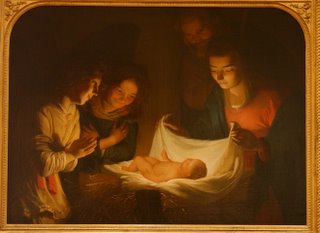 Can one little iota really make a big difference? Yes. In fact, it nearly ruined Christmas -- before Christmas was even a formal liturgical celebration.
Can one little iota really make a big difference? Yes. In fact, it nearly ruined Christmas -- before Christmas was even a formal liturgical celebration. In 325 at the Council of Niacea, the infamous Arian heresy was disputed and condemned. Arius, as well-intentioned as he was misled, had proposed that Jesus was neither God nor man; he was, rather, somewhere in between, something akin to the demi-gods of the classical world. Arius used the term 'omoiousios to describe this. The prefix 'omoi, is from a Greek adjective meaning "like" or "similar to" and ousios is from the participle of the Greek verb "to be." Literally, he asserted that Jesus was "similar in being, in substance" to God. The council fathers, insisting that Jesus is truly God, preferred the term 'omoousios, simply deleting the iota from Arius' term. This word is formed from another Greek adjective, 'omos which means "the same as." (Please note that this is not the same root as Latin word for man, "homo, hominis" though when transliterated into English, it looks very similar).
So why all the fuss about technical, headache-provoking, theological terms on Christmas day? Had it not been for the insight and perseverance of the fathers of the Council of Niacea, we would not be celebrating the Incarnation. One little iota could have obscured this precious truth of our faith; this most sacred of mysteries would have been lost in the annals of Church history. So as we kneel before the creche today, let us whisper a prayer of thanksgiving for those heroic defenders of our faith who kept alive the legacy of this great mystery amid much confusion and controversy.
A happy and holy Christmas from
the Sisters of the Visitation of Georgetown.
"When the magi kissed the feet of Jesus, they kissed the feet of God."
St. Francis de Sales
No comments:
Post a Comment